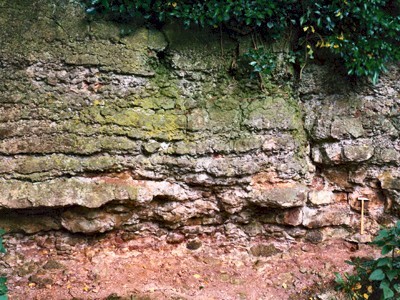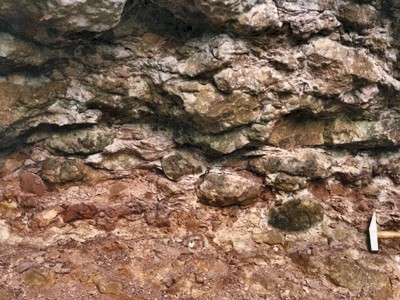Earth Science Conservation Review
| Drumarg - Carboniferous | Armagh |
| Site Type: | Cliff |
| Site Status: | ASSI |
| Council area: | Armagh District Council |
| Grid Reference: | H86774409,H86904392 |
| Google maps: | 54.3378,-6.66704 |
| Rocks | |
|---|---|
| Rock Age: | Carboniferous (Asbian, Visean) |
| Rock Name: | Armagh Group |
| Rock Type: | Limestone, Shale |
| Interest | |
| Fossil Groups: | Brachiopod, Coral |
| Other interest: | palaeokarst, Marine sediments |
Summary of site:
Shallow water limestones are the commonest rock types in the Asbian stage of the Armagh Group of Carboniferous rocks (335-340 million years old) and this 200m long cliff is one of their finest exposures. About 10m thickness of limestones can be seen here, the earliest occurring at the north-west end, the most recent at the south-east. They are gently inclined to the north.
At the base 2.25m of grey, medium to coarse grained limestone with purple-grey partings are present, incorporating a bed almost 1m thick showing clear effects of ancient soil formation. Above this level are 4.4m of thickly bedded, fine grained limestones broken into angular fragments (breccias) during soil formation. The limestones are grey but the shale component of the soil imparts a reddening. The top beds are less disrupted but still show evidence of brecciation.
Despite this intense disruption, recognisable fossils have survived in the limestones, mostly brachiopods and colonial corals, betraying their marine origins.
These rocks were formed in a shallow tropical ocean margin around 25km wide, extending 75km to the north. They emerged above sea level with such frequency and for periods sufficiently long, for soils to form and there was a supply of clays and silts hinting at land in the vicinity, probably to the south and maybe to the east. Exposure of the Armagh Group is not good enough to allow estimates of the total area of pedogenic (soil related) disruption to be made but it was probably considerable.
This site is seriously threatened by the suburban sprawl of Armagh, as housing developments relentlessly spread south west of the city.
At the base 2.25m of grey, medium to coarse grained limestone with purple-grey partings are present, incorporating a bed almost 1m thick showing clear effects of ancient soil formation. Above this level are 4.4m of thickly bedded, fine grained limestones broken into angular fragments (breccias) during soil formation. The limestones are grey but the shale component of the soil imparts a reddening. The top beds are less disrupted but still show evidence of brecciation.
Despite this intense disruption, recognisable fossils have survived in the limestones, mostly brachiopods and colonial corals, betraying their marine origins.
These rocks were formed in a shallow tropical ocean margin around 25km wide, extending 75km to the north. They emerged above sea level with such frequency and for periods sufficiently long, for soils to form and there was a supply of clays and silts hinting at land in the vicinity, probably to the south and maybe to the east. Exposure of the Armagh Group is not good enough to allow estimates of the total area of pedogenic (soil related) disruption to be made but it was probably considerable.
This site is seriously threatened by the suburban sprawl of Armagh, as housing developments relentlessly spread south west of the city.
| Enlander, I., Dempster, M. & Doughty, P., 2025. Drumarg - Carboniferous, County Armagh, site summary. [In] Earth Science Conservation Review. https://www.habitas.org.uk/escr/summary.php?item=275. Accessed on 2025-04-03 |
| Previous Site | Next Site |

